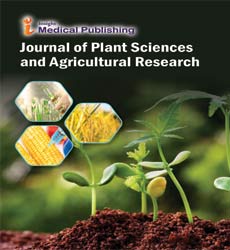Plant Diseases and Global Agriculture: Advances and Future Directions in Plant Pathology
Carl Muller*
Department of Food Science, Technical University of Munich, Munich, Germany
- *Corresponding Author:
- Carl Muller
Department of Food Science, Technical University of Munich, Munich,
Germany,
E-mail: muller_c@tumc.gr
Received date: August 22, 2024, Manuscript No. IPJPSAR-24-19135; Editor assigned date: August 26, 2024, PreQC No. IPJPSAR-24-19135 (PQ); Reviewed date: September 09, 2024, QC No. IPJPSAR-24-19135; Revised date: September 17, 2024, Manuscript No. IPJPSAR-24-19135 (R); Published date: September 23, 2024, DOI: 10.36648/ipjpsar.8.3.148
Citation: Muller C (2024) Plant Diseases and Global Agriculture: Advances and Future Directions in Plant Pathology. J Plant Sci Agri Res Vol.8 No.3: 148.
Description
Plant pathology is a multidisciplinary field that focuses on the study of plant diseases, their causes, interactions and management strategies. With the world's growing population and the increasing demand for food security, the importance of plant pathology has never been more important. The key aspects of plant pathology, including its significance, current trends, challenges and future directions.
First and foremost, understanding the significance of plant pathology requires recognizing the pivotal role of plants in sustaining life on Earth. Plants provide food, fiber, fuel and numerous other resources essential for human survival and wellbeing. However, various pathogens, including fungi, bacteria, viruses, nematodes and parasitic plants, pose significant threats to plant health and productivity. Plant diseases can result in substantial yield losses, economic hardship for farmers and food shortages, thereby impacting global food security and socioeconomic stability.
In recent years, plant pathology has witnessed notable advancements in various areas, driven by technological innovations and scientific discoveries. Molecular biology and genomics have revolutionized our understanding of plantpathogen interactions, enabling researchers to decipher the genetic mechanisms underlying disease resistance and susceptibility in plants. This knowledge is instrumental in developing novel strategies for breeding disease-resistant crop varieties through conventional breeding approaches or modern biotechnological methods such as gene editing and genetic engineering.
Management of plant diseases
Moreover, the field of plant pathology is increasingly embracing interdisciplinary approaches, integrating disciplines such as epidemiology, ecology, bioinformatics and data science to address complex challenges in disease management. For instance, the advent of precision agriculture and digital farming technologies has facilitated real-time monitoring of disease outbreaks, predictive modeling of disease spread, and targeted application of control measures, thereby enhancing the efficiency and sustainability of crop protection strategies.
Additionally, the management of plant diseases is becoming increasingly complex due to the development of pathogen resistance to chemical pesticides and the growing consumer demand for sustainable agricultural practices. Hence, there is a growing emphasis on the development and adoption of Integrated Pest Management (IPM) strategies that combine multiple approaches, including cultural, biological and chemical control methods, to minimize reliance on agrochemicals while maximizing crop productivity and environmental sustainability.
Looking ahead, the future of plant pathology lies in harnessing the power of innovative technologies, such as artificial intelligence, machine learning and genome editing, to develop innovative solutions for disease management and crop improvement. Furthermore, encourage collaboration between researchers, industry stakeholders, policymakers and farmers is essential to ensure the translation of scientific discoveries into practical applications that benefit agriculture and society as a whole.
Conclusion
Plant pathology plays a pivotal role in safeguarding global food security and sustainable agriculture by mitigating the impact of plant diseases on crop productivity and quality. While the field has made significant strides in recent years, ongoing research and collaboration are needed to address emerging challenges and capitalize on new opportunities for innovation and improvement in disease management and crop protection strategies.
Open Access Journals
- Aquaculture & Veterinary Science
- Chemistry & Chemical Sciences
- Clinical Sciences
- Engineering
- General Science
- Genetics & Molecular Biology
- Health Care & Nursing
- Immunology & Microbiology
- Materials Science
- Mathematics & Physics
- Medical Sciences
- Neurology & Psychiatry
- Oncology & Cancer Science
- Pharmaceutical Sciences
